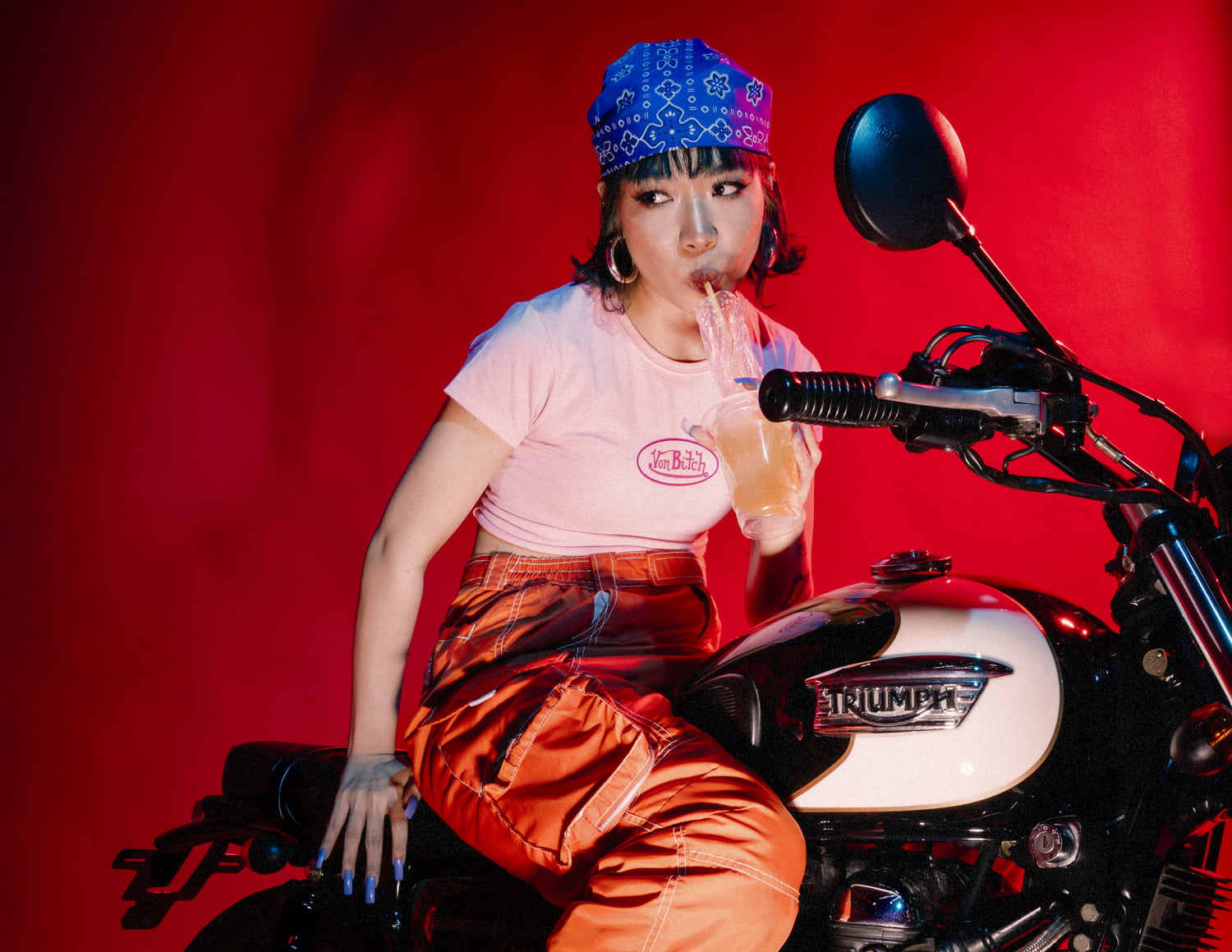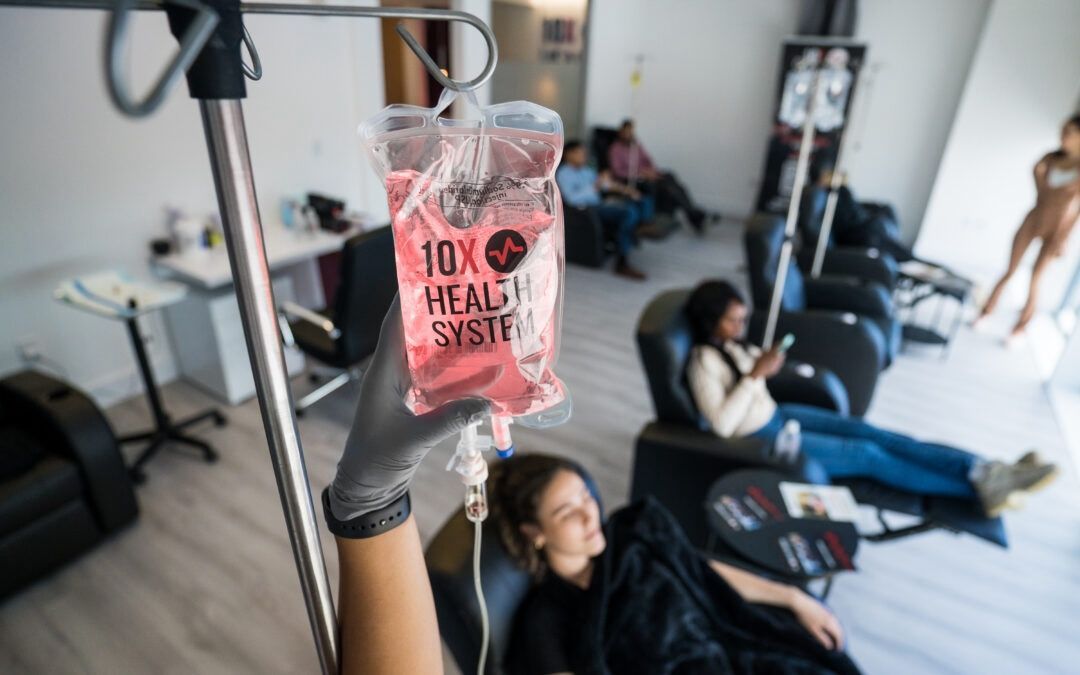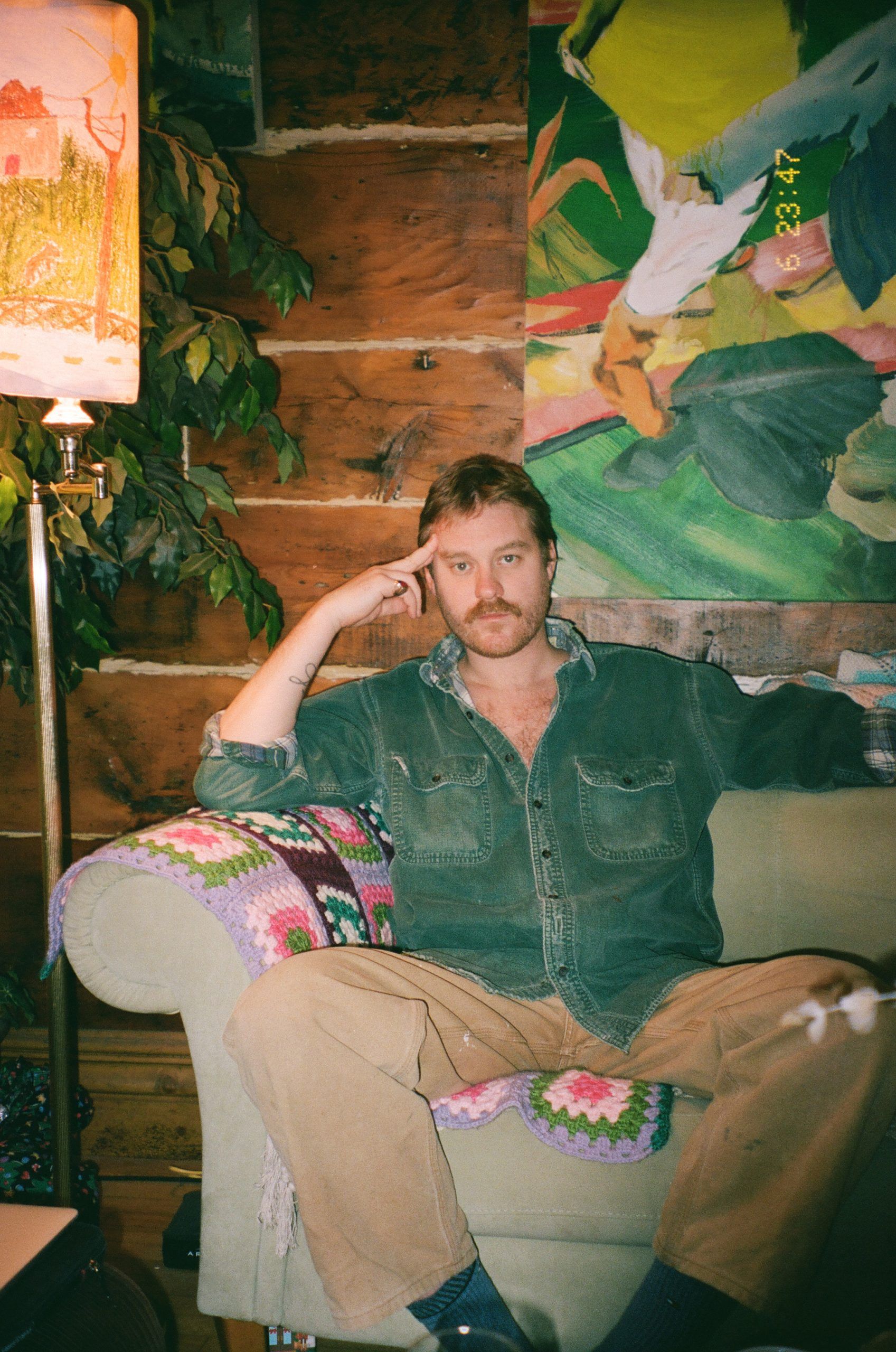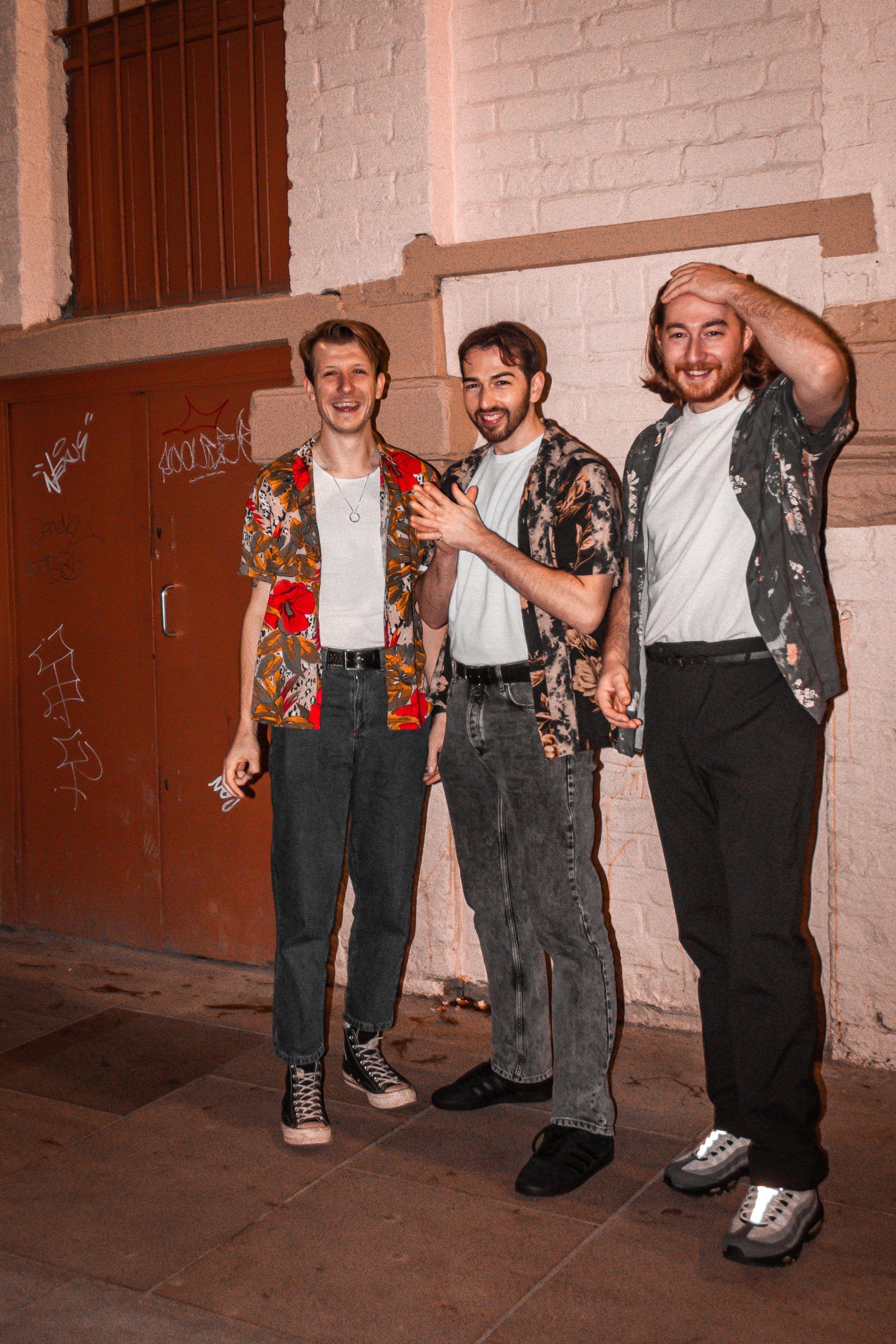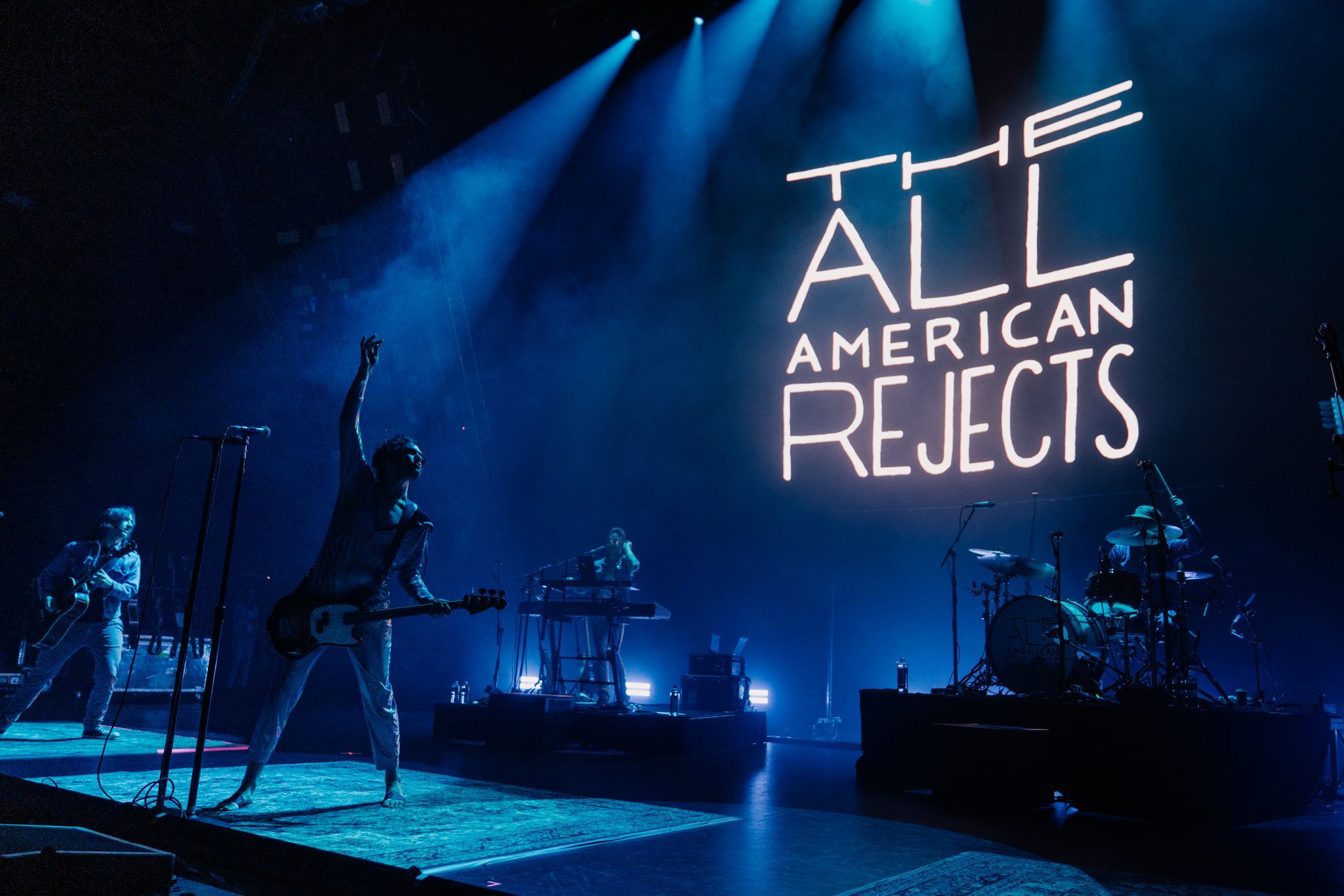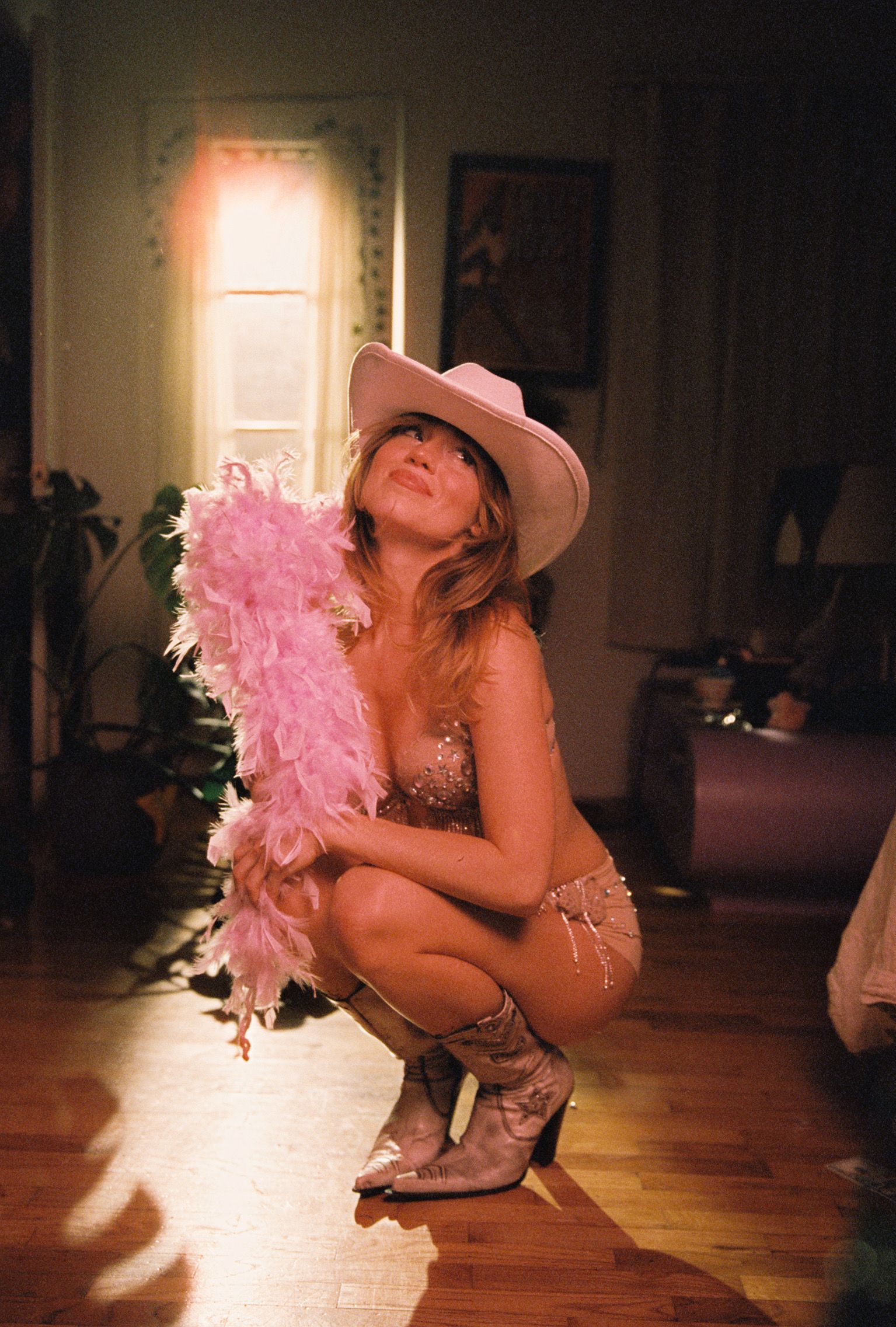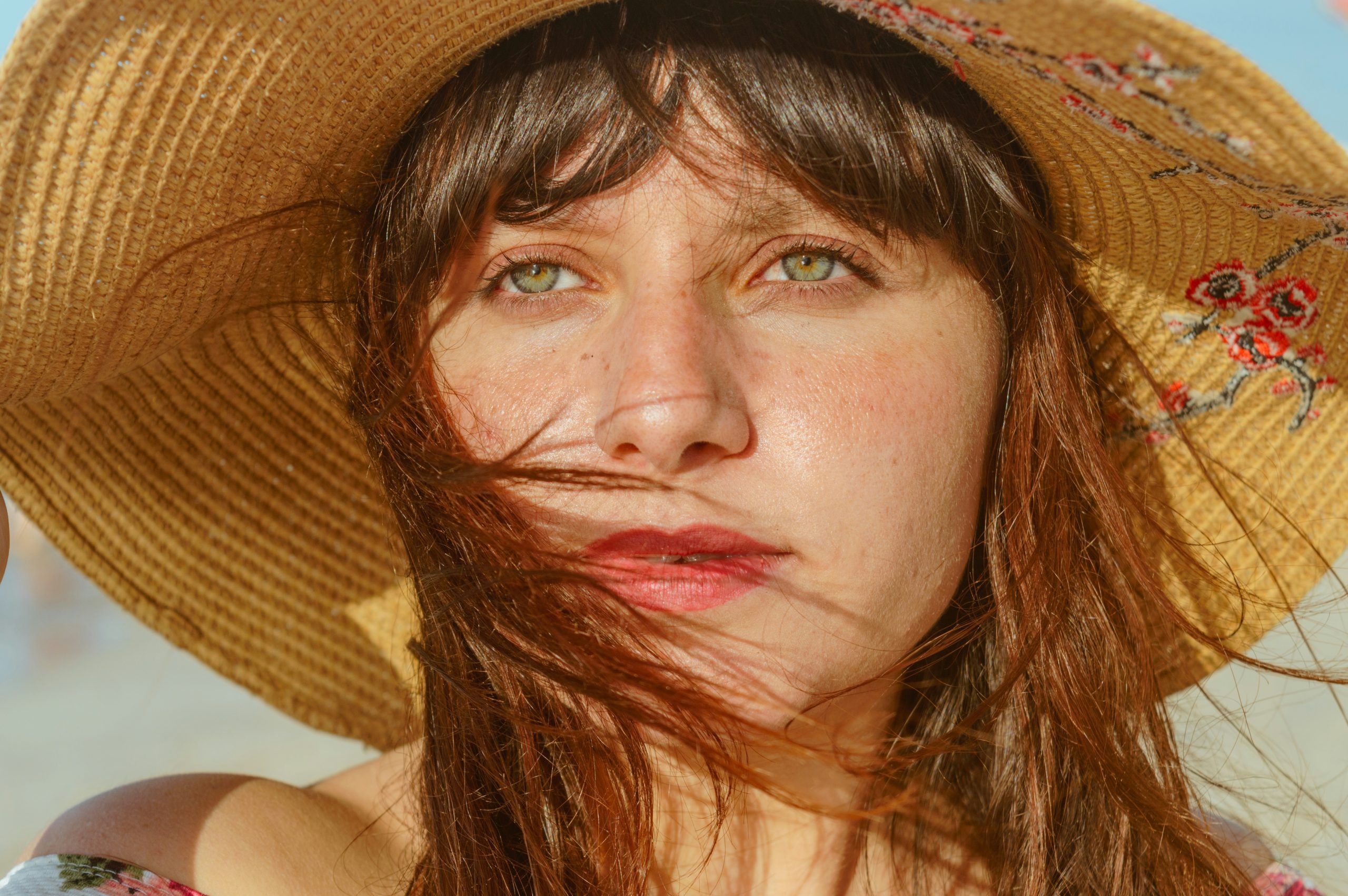Interviewing Ramengvrl feels like having an intimate, late-night sleepover conversation with your cool and rebellious BFF.
There’s no publicist or manager in sight, just Ramengvrl, who sits in front of her closet wearing an olive green beanie and two silver chain necklaces. It’s nearly midnight in Jakarta during our Zoom chat, but a quick-witted Ramengvrl drops wisdom, cracks jokes, giggles, and––as per usual––holds absolutely nothing back. After all, outspokenness is Ramengvrl’s forte. The hip-hop artist and rapper’s fearlessly frank lyrics about sex, gender dynamics, sexuality, and other hot button issues shatter conservative Indonesian standards of womanhood and smash glass ceilings in an internationally male-dominated industry.
Ramengvrl (Putri Estiani) rose to fame four years ago with her gutsy breakout hit “I’m da Man” and secured her spot as a major name in Indonesia’s hip-hop and rap scene after putting out her mixtape, no bethany, in 2019. When I catch up with Ramengvrl, she’s recently dropped her self-assured, explicit (in every sense of the word), and emotionally honest release debut LP CAN’T SPEAK ENGLISH. As we take a deep dive into the album, Ramengvrl opens up about topics ranging from her superfan parents and aspirations to become “the female Drake” to what it’s like to be the only female artist in the room and why she will not call herself a feminist even though she “fucking loves feminists.”
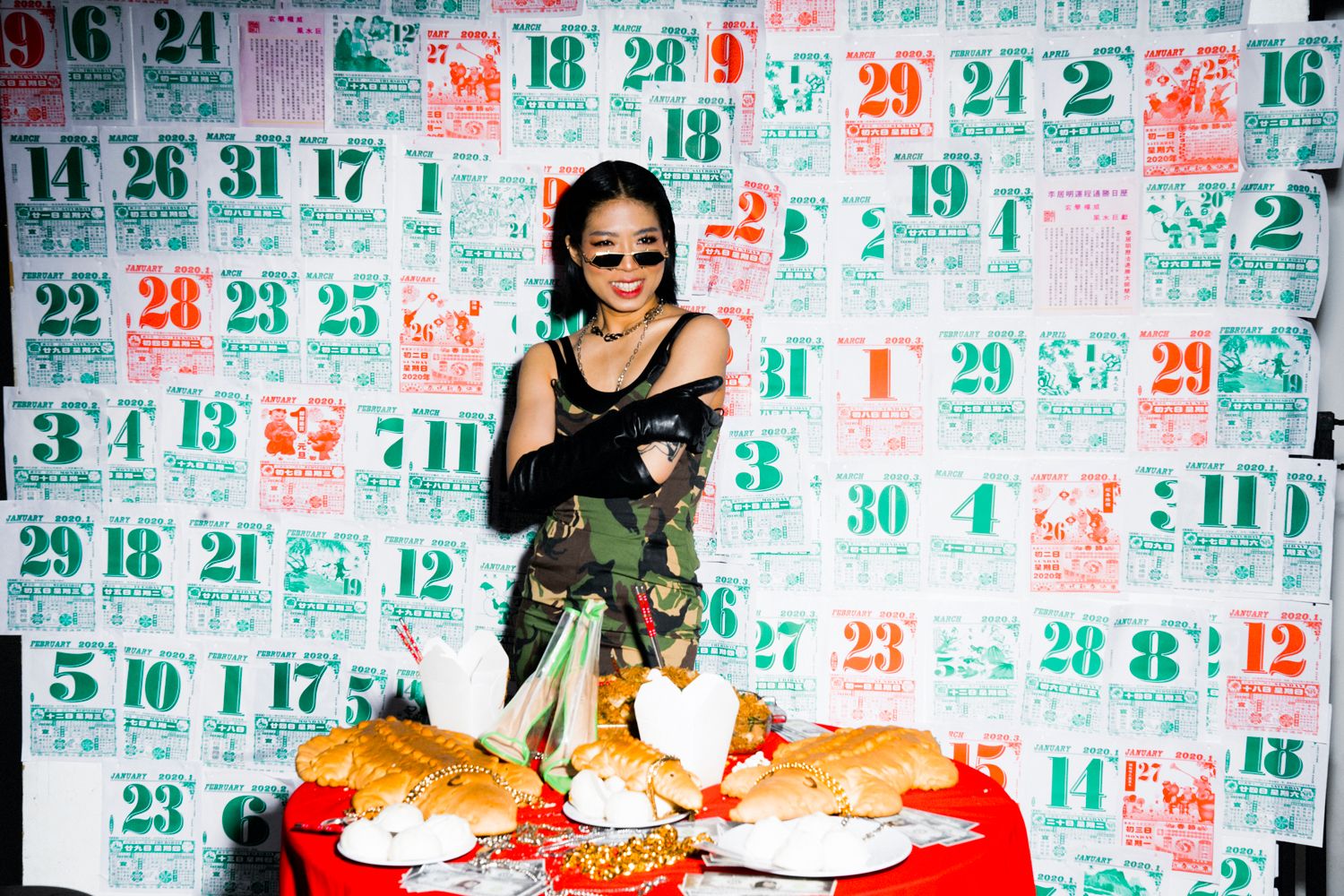
Let’s start simple: Why do you call yourself Ramengvrl? I’d love to know when and how you came up with that name…
That’s a classic question. Obviously, I love ramen, and I love Japanese pop culture. Other than that, I got the name back in 2013. That was the first time I decided, “Ok, I want to do rap.” But at that time, I was like, “I’m not sure if I’m good enough to wow people, so I just want a name that’s memorable but also not giving out too much expectation for people who really do listen to rap.” [I thought to myself], “If I just go by Ramengvrl [and people don’t think I’m that good, I’ll be like], ‘My name is Ramengvrl, what would you expect?’” But apparently people loved it, so…
Prior to CAN’T SPEAK ENGLISH, your most recent project was no bethany. How have you grown in the intervening year-and-a-half, and how does CAN’T SPEAK ENGLISH reflect that growth?
A lot has happened. CAN’T SPEAK ENGLISH is the best version of me, at the moment. When you compare that to no bethany, so much adulting has happened during that period. If I look back on the no bethany mixtape, I probably would never make something like that now. But it’s ok. I feel like that’s the journey. In no bethany, I was still quite pressured trying to please people’s expectations… But honestly, I don’t even care about [being] the best rapper. I just wanna put out good music, and [wanting to be the best was] the type of thinking that I just let out the backdoor [while] making CAN’T SPEAK ENGLISH. That’s why, in the album, I’ve got a lot of non-rapping songs [like] Tsundere [and] The Emo Song. A lot of people didn’t expect that. But that’s me leaving those pressures behind and just being 100% me.
My next question is also about your new album. Can you give us some insight into the meaning behind the title, CAN’T SPEAK ENGLISH? Does it have anything to do with colonialism and the glorification of Western culture? I know you’ve touched on those topics in the past…
It definitely relates to that. A lot of people are like, “Yo, why’d you name your album CAN’T SPEAK ENGLISH? You can speak English!” Ok, first of all, I did speak English right when I was born. But that’s beside the point. The idea came to me when I was in the U.S. last year. Every time I went abroad in a country where everybody speaks English [and] English is the mother tongue, I felt this inferiority complex. I always say, “Everyone is equal, blah blah blah,” but I always think, “Maybe they are better than me.” I think that’s the postcolonial thinking embedded in me ever since I was born. And that’s not only happening to me but also to a lot of Indonesian youngins. Ugh, a lot of them always try to [use] these, I would say pointless, English words. Like, they’re saying “basically” instead of the Indonesian word for that, they’re saying “literally” every single time, they’re saying “technically.” Like, “basically,” “um,” “for the record”… there’s a lot of other pointless English phrases… And for me, that shows that you think you need to insert English words just to sound kind of high-class, kind of smart. But that’s not it. You don’t have to do that.
English is just a language. Any language is just a language, and that’s your insecurity talking. And what I’m trying to say on the album is, you know, fuck that, just be confident in who you are, believe in yourself, and you’ll eventually get somewhere. When I was in the U.S., [I always used to say], “Ooh, I’m sorry guys, my English is not that good, I can’t speak English.” But they’re like, “No. Your English is good.” And I’m like, “Huh.” At one point, I was like, yeah, my English is good. So why do I keep saying my English is not good? That’s just my [feelings of] inferiority talking. Stop saying “I can’t speak English”!
CAN’T SPEAK ENGLISH features collabs with artists ranging from Ted Park to Pyra. Why did you decide to collaborate on almost half of the album’s tracks?
It comes back to the fact that I haven’t really done a lot of features in my own body of work. I mean, I’ve done a lot of features, but in somebody else’s work. So I feel like, yo, for this album, I just want to work with a lot of different people but also at the same time, if we’re talking business- and marketing-wise and all that, it also kind of spreads [the word]. Cause they have different fanbases, so I want to also tap [into] their fanbases as well. But other than that, I’m so used to working alone for my own singles, so working with these different people from different backgrounds really [gave me] some perspective that also [helped] with shaping the album that it is now.
Take us through the process of writing and producing CAN’T SPEAK ENGLISH.
I actually recorded all of the songs and wrote 90% [of them] on a U.S. trip. It was just two weeks in the U.S. in August. I came back to Indonesia with 20 demos in hand [and] 10 of them became the tracks in the album. The process was a combination of easy, as in it just flows naturally, because I always write what I am feeling at the moment, but also difficult at the same time because [of] pressure. [I was] in the U.S., [and] in the studio there’s a lot of “legit” rappers that came from the Bay, and I’m just this Asian girl from Indonesia. I [was] like, “Ok, I need to prove my point.” So that’s why you see in Look At Me Now, [for example], I put the fast rap on it.
But also, at the same time, I put that pressure [away]. I started focusing on more “singing” songs, songs that I feel [in] the moment, like Tsundere, The Emo Song and Blue Skies. [Making the album] was quite fast, actually. One thing about me is that I cannot really write in the studio. When I [am] in the studio, I usually already [have] things prepared. Like I already got the lyrics written down, so all I really need to do is [say], “Give me two hours, maximum, and chicken wings, and I will just do my job in the course of two hours.” And then I’m done for the day… Just give me some space in the Airbnb or hotel to write. I guess that’s why a lot of people think I have a ghostwriter because they never see me write, but that’s basically the whole process.
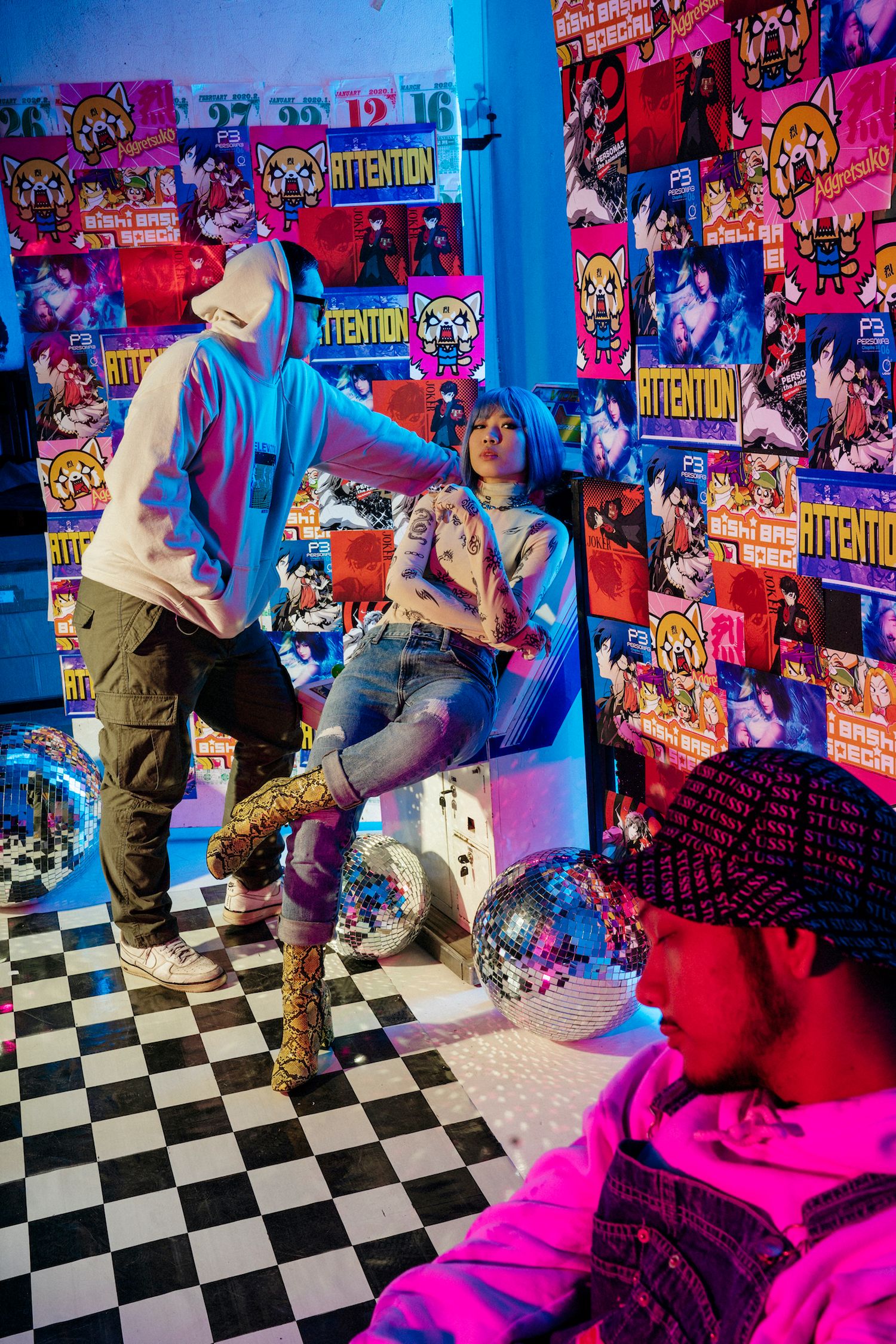
On the title song, which is also the final track, there’s a lyric where you say, “I’m all about LGBTQ rights…I know what queer is, unlike you. 90% of Indonesians don’t even know what Q stands for.” I think that’s really poignant, and I’m wondering, from your perspective, how do you think queerness can become more visible––and acceptable––in Indonesia?
See, that’s really a challenge because a lot of people don’t know that, in Indonesia, you need to have religion stated in your ID card. That’s just one thing, but that shows how conservative and how very religion-centric Indonesia is. Even though [they] keep saying that [it’s secular], a lot of people know that we like to mix policies and religions…and the Indonesians, mostly, they don’t really accept the LGBTQ community.
I never self-proclaim that, “I’m a feminist! Go gays and girls!” I don’t need to say that. [People] can [hear] that in my songs. But––and I don’t know if I can say this here or not––I was high recording [this song], so obviously it shows, and I just kind of say what’s on my mind, and apparently I freestyled all of it, which is crazy, because I cannot fucking freestyle. So it was weird because at one point I was talking shit to a certain bitch, wherever that bitch is, and then I realized, “Wait, why am I so angry about this certain bitch? Who even is this bitch? I’m all about women rights and LGBTQ rights.” [And then] it just came on me: Indonesians, sometimes they’re fucking dumb. They don’t even know what the Q stands for in LGBTQ. That’s legit a true story. A lot of people don’t even know what LGBT stands for, so I’m just trying to shed a light on that while getting trippy.
You mentioned feminism, which leads me to another question. In an interview from a while ago, you said, “I won’t say I’m a feminist, but I won’t say I’m not a feminist either. I feel like to call yourself a feminist, there should be significant things you have done in your life to push that agenda. I feel like I haven’t done anything of that sort in my life so far.” I was surprised to read that because in a lot of your songs you do seem to push a feminist agenda by speaking frankly about gender dynamics and sexuality, and rebelling against traditional ideas about womanhood. In your mind, what would it take for you to earn the title of “feminist”? I’d also love to hear any other thoughts you have about feminism and your relationship with it…
I don’t want to proclaim myself a feminist because there are so many people out there who’ve done more than I’ve done [for] feminism [and] women’s rights. I don’t want people to see me as a role model for feminism because when they ask me what feminism is, I might not be able to give them a concrete meaning. All I know is that it’s about supporting women’s rights to be equal to men’s rights. For me, I’m all about seeing people as equal [but] there’s so many people that have done way more than I have…talking at conferences, [participating in] women’s marches, [writing] poems about women and women suffering… And me? I’m just here trying to make good music with a good message that I also live by. And if the messages that I live by correlate with feminism, that’s good… I fucking love feminists. I think what they’re doing is great. Just don’t see me as a role model for that… You don’t even have to call it feminism. Just call it empowerment… I’m just trying to be a good public figure.
What advice would you give to a young woman who is working to break into the male-dominated music scene in Indonesia, or any country, for that matter?
Don’t fucking care. Females, we care too much. [For example]…hip hop is a very male-dominated genre everywhere, even in the U.S., but in Indonesia, it’s 1,000 times amplified…I might be the only female in the room when there’s a hip-hop event in a club or something. But I’m still killing it. Why? Because maybe I don’t care. I [only] care about my music and my work.
There’s gonna be haters, for sure… Whatever your genre is, because this happens in every single genre, there’s always gonna be someone who comes up in the comments not applauding your work, not even critiquing your work, but saying some shit like, “Oh, that’s such a fat thigh!” There’s always gonna be that person because you’re a female. That’s just what happens. This is a man’s world. People will [put] double the pressure on you, more than they [put on] males, but that’s ok. Just don’t fucking care. If you’re good, then people will fuck with you. If you’re not, then don’t blame it on being female. It’s just the quality of your art. [Basically], I don’t think you should care. Also, [I’ll] be the devil’s advocate. A lot of people focus more on the pressure, but…if you’re the only female, then they’ve only got eyes on you. So that’s your advantage. Fucking use that.
Who are some female musicians that inspire you?
Definitely, Nicki Minaj… She paved the way for female rappers. There’s a lot, [like] Missy Elliott [and] Lil’ Kim [and Rihanna], but I feel like Nicki Minaj is just so successful in every department. In music, in fashion, in beauty…she’s turned her whole name into a fucking household name, and that’s what I wanna do. I kinda want to be the female Drake, if that’s possible.
Before you broke into the music industry, you worked a 9 to 5 cubicle job. How, if at all, does the experience that you had in the corporate world inspire, or at least seep into, the music that you make today?
It definitely made my early music sound super angsty. [My early songs were] like, “Yo, I’ve done this whole 9 to 5 job. I’m done pushing numbers and all that. I’m me. I’m breaking free, guys. Fuck y’all.” That’s kind of the reason why a lot of people [knew] me first as, “Oh, her [songs] are all bangers.”
Other than that, I feel like working 9 to 5 made me realize how lucky I am right now to be able to break out from that and become the me that I am now, doing what I love the most, and getting money from that. And…what I love the most is sleeping and waking up at 2:00 p.m. every day. No, I’m just kidding! I consider myself very lucky, very blessed, and very grateful, and after all these years, those are the key messages that are…apparent in the songs on CAN’T SPEAK ENGLISH. Like, compared to my early years, I usually talked about, “Fuck you, look at me, I don’t care what y’all say. I do what I want, I say what I want. Y’all still stuck in the same day job because you fucking bullied me.” Like, [it was] super arrogant. [Which is] deserving because I did work hard for that. But also, yo, is that the only thing I can talk about? The answer is no. So now the message of being grateful is more apparent here. Now, for the past few years, I’ve kind of forgotten the fact that I did that 9 to 5 job, the fact that I’ve done a few years of doing what I fucking hated. But now I’m starting to be aware again of that period in life and put that in my music.
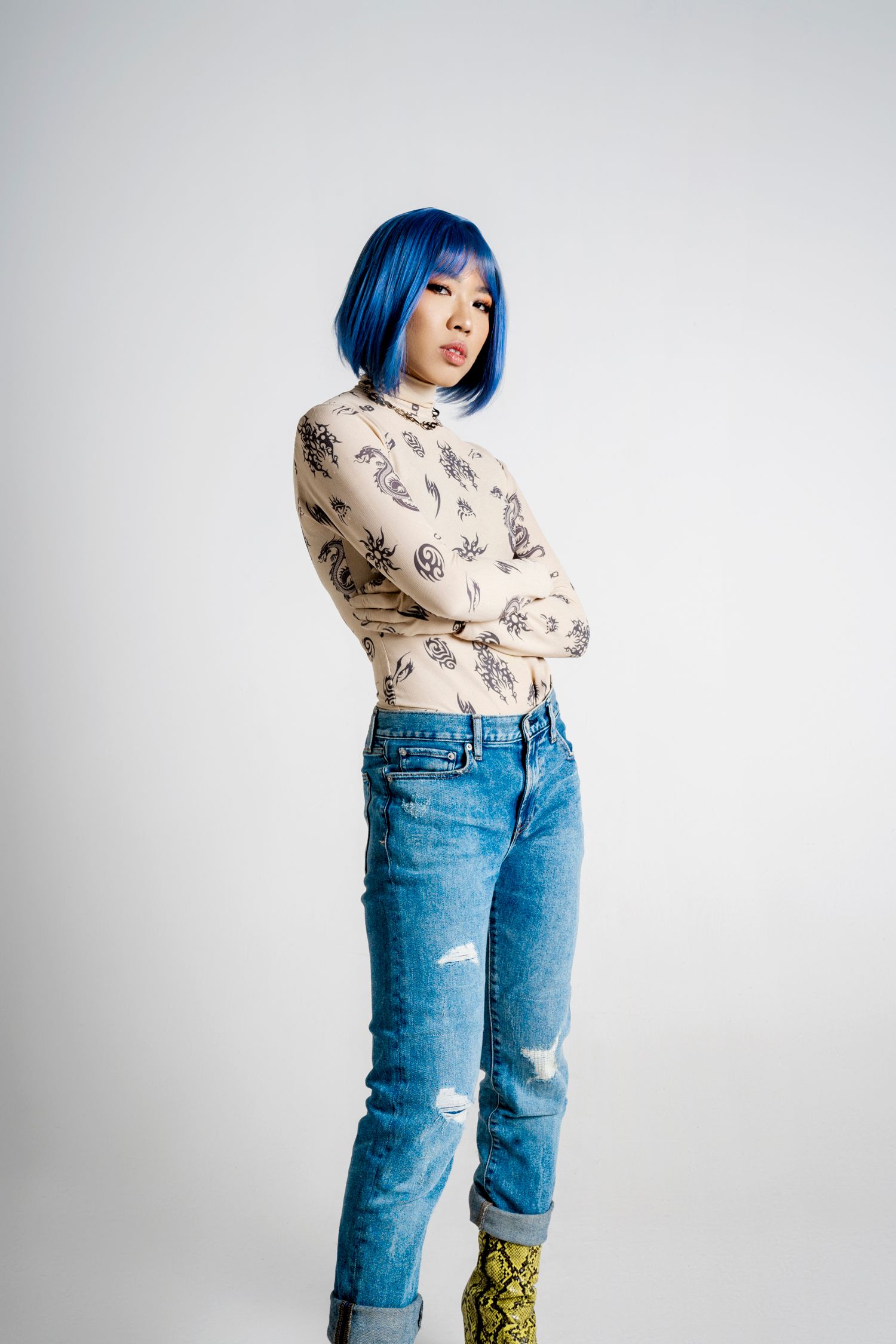
Speaking of your earlier life, I understand that you grew up in a very conservative family, and for a long time you didn’t tell them about your musical aspirations. What is your relationship with your family like today? How do they respond to your music?
Now they are crazy supportive to the [point] that it’s kind of annoying. For real! I don’t live with my parents [but] I go back to [their house] every other week. And every time I go back, I find my mom with three different phones all playing my videos. It’s just so weird! And she’s not even watching [them], she’s looking at the TV [which is] also playing my videos!
At first, they weren’t super supportive about it, but not because they didn’t want to support what I want to do in life. It’s the fact that before music, there’s nothing I started that I finished. There’s just nothing. Like, I’ve tried photography, fashion, becoming a fashion magazine reporter… I’ve tried all of that. But nothing really worked out, probably because I’ve got the attention span of a squirrel! Also, maybe those things just [weren’t] for me. I was hiding the fact that I was doing music because I didn’t want to tell them, get their expectations high, and then not finish it. I just wanted to tell them when I got to a certain point [and] couldn’t go back. Eventually they knew, and when they knew about it, they still said, “Are you sure? Because corporate jobs, they pay you every single month with the same paycheck, they give you insurance…” And I’m like, you know what? That’s just not for me. I do not like to get the same paycheck every single month. I actually prefer them to be different, preferably always getting higher. Maybe sometimes it’s getting lower…that’s just life, going up and down. I don’t like 9 to 5.
But, [again], now my parents are very supportive. They keep bragging about me to their neighbors, and I’m just like, “Mom. Dad. Don’t.”
You were talking about fashion, and I love your fashion sense! I’ve noticed that you embrace both femininity and masculinity in your clothes, and I’m wondering why it’s important for you to do that?
The answer is quite simple: Because fashion is a statement of who you are. I always say that I’m about self-expression and nothing else. And other than expressing myself in my songs, I love to express myself through what I’m wearing. So that’s why you rarely see me wearing a fitted t-shirt and fitted jeans unless that’s a statement [or] a critique. Unless it’s a statement, I’m not gonna wear it. But at the same time, I’m not the type who really thinks [too hard] about what I’m gonna wear. It just comes naturally. I haven’t even shopped for clothes for the past six months… For me, it’s not about getting new [and] branded stuff. Although I love branded stuff, don’t get me wrong. But you will never see me wearing…branded [clothes] from top to toe because for me, that’s not a statement. That’s just you having a lot of money, and you want to spend it, but you don’t have a sense of style.
Yeah! I actually noticed that, on your album, there seem to be moments where you’re critique consumerism. Is there a message that you’re trying to send about material excess?
That’s always been one of my key messages, even in [my 2018 hit single] “CA$HMERE”… If people [look at that song’s lyrics, they see that] I basically critique these young kids––I say young kids as if I’m like 40!––[who] have the tendency to spend 90% of their money just to get fucking Nike Air Jordans, and now they have nothing left to pay rent, and for me that’s bullshit. Like, why would you do that? Bro, I know what it feels like to only have a certain amount of money every single month. Like you work and work and work very hard, but then you only get a certain amount of money. But I don’t shop, I don’t go to the hottest cafés, I don’t do that… The thing is with these youngins, I feel like they’re just very materialistic…
A lot of people might see [some of my work] at first glance as me also spreading that materialism. But if people [read deeper into the lyrics], the materialism that I talk about comes from being grateful and just celebrating the outcome of my hard work. So that’s what I mean. Like, you can have nice things, nobody said that you cannot have nice things… Trust me, I’m a Taurus––I love nice things! But if you wanna have those nice things, it comes with a sacrifice. And what are you sacrificing? I sacrifice time. I sacrifice my energy to get to the lifestyle that I want right now. I know the lifestyle that I want, and I know how to get it, and I did [get] it. So why are you now not doing 100% or even 120% but want the outcome of someone who’s doing 200%?
What are your plans for the future? Five years from today, what do you want to be doing?
I just want to be chilling! Haha, no, I’m picturing myself still doing music, but a thousandfold better than now. I [will] make music with super dope features, basically leveling up, having a better team, having my own company… More money, more life, more blessings. And more––this is important––more free time. I really want more free time. [I’m] not saying that I don’t have free time today, but I want to get to the point where I can just, bam! Flick my finger, and then something’s done. Boom. So I don’t know if that’ll happen in the next five years, but you know, [I’m] putting that out to the universe. Manifest!
CAN’T SPEAK ENGLISH is out now. Follow Ramengvrl via @ramengvrl
Interview by Leah Cates

